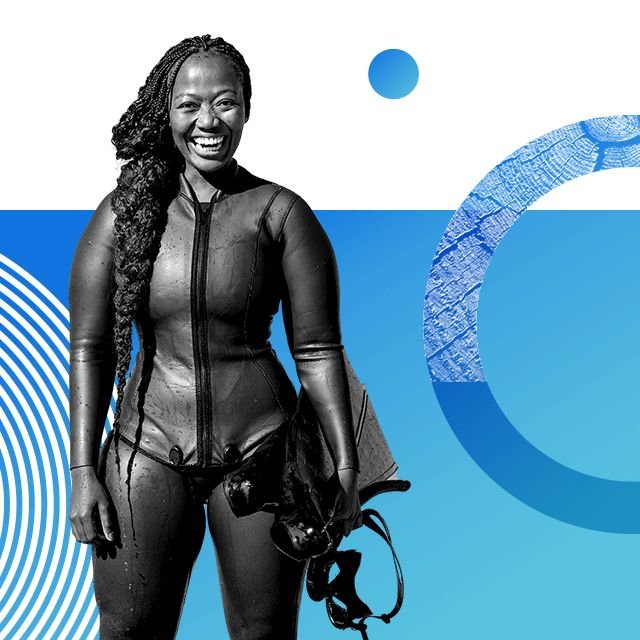28 “climate pioneers” in the BBC’s Top 100 women list this year - planet-wide, endlessly enterprising and worth heralding
Zandile Ndhlovu, South Africa, founder of Black Mermaid Foundation (from BBC Climate Pioneers list)
We support the basic idea of the BBC’s annual Top 100 Women list - but we were particularly taken by their list of 28 climate pioneers, for its highlighting of diverse, hands-on climate activists, mostly unknown but entirely deserving of the spotlight. Here’s a few entries:
Basima Abdulrahman, Iraq
Green building entrepreneur
In 2014, when the so-called Islamic State group took over huge parts of her home country, Iraq, Basima Abdulrahman was studying at university in the US.
Many Iraqi towns were destroyed as a result of fighting, but when Abdulrahman returned home after her masters in structural engineering, she saw a way of helping.
She founded KESK, Iraq's first initiative dedicated to green building. She found that creating greener structures meant combining the latest energy-efficient technologies and materials with Iraq's traditional building methods.
She is committed to ensuring that today's building practices do not compromise the well-being of future generations.
I am often anxious about the climate crisis. I can't help but wonder how anyone can find peace without being part of the solution to mitigate its risks.
Gladys Kalema-Zikusoka, Uganda
Veterinarian
As an award-winning Ugandan vet and conservationist, Gladys Kalema-Zikusoka works to save the country's endangered mountain gorillas, whose habitat is being eroded by climate change.
She is founder and CEO of Conservation Through Public Health, an NGO that promotes biodiversity conservation by enabling people, gorillas and other wildlife to co-exist, while improving their health and habitat.
After three decades, she has helped increase the number of mountain gorillas from 300 to about 500, which was enough to downgrade them from critically endangered to endangered.
Kalema-Zikusoka was named a Champion of the Earth in 2021 by the United Nations Environment Programme.
What gives me hope in the climate crisis is the increasing acknowledgement that it needs to be addressed urgently. There are innovative methods to mitigate and adapt to this crisis — Gladys Kalema-Zikusoka
Leanne Cullen-Unsworth, UK
Marine scientist
Seagrass is known for its ability to store carbon and provide nurseries for fish, but some underwater habitats have been devastated.
Leanne Cullen-Unsworth is one of the founders and current CEO of Project Seagrass, the UK's first seagrass restoration scheme at a meaningful scale.
The project makes the process easier by using a remote-control robot to plant seeds, and could create a blueprint to help other countries restore their underwater meadows.
An interdisciplinary scientist with more than 20 years of experience in marine research, Cullen-Unsworth is devoted to science-based conservation and restoration.
There is too much to do for anyone to achieve things alone, but people are working together and sharing knowledge. For my own small part, I know we can revive a vital habitat, protect it and restore it for all of the benefits it provides our planet and society. —Leanne Cullen-Unsworth
Sumini, Indonesia
Forest manager
In Indonesia's conservative Aceh province it is unusual for women to be leaders.
When Sumini realised a major cause of floods in her village was deforestation, which also contributes towards climate change, she decided to take action and work with other women in the community.
Her group received a permit from the Ministry of Environment and Forestry allowing the community of Damaran Baru village to manage the area, all 251 hectares of forest, for 35 years
She now leads a Village Forest Management Unit (LPHK), to discourage illegal logging and hunters threatening Sumatran tigers, pangolins and other at-risk wildlife.
With rampant deforestation and wildlife poaching these days, forests should get more and more attention when it comes to how we collectively tackle the climate crisis. Keep the forest, keep the life. —Sumini
Neha Mankani, Pakistan
Midwife
When devastating floods hit Pakistan last year, midwife Neha Mankani travelled to affected areas to offer her skills.
Through her charity, Mama Baby Fund, Mankani and her team provided life-saving birthing kits and midwifery care to more than 15,000 flood-affected families.
Her typical practice focuses on low-resourced settings, emergency response and climate-affected communities.
Mama Baby Fund has now raised enough money to launch a boat ambulance that will transport pregnant women living in coastal communities to nearby hospitals and clinics for urgent treatment.
The work of midwives in communities facing climate-related disasters is vital. We are both first responders and climate activists, who make sure women can continue to receive the reproductive, pregnancy, and postpartum care they need, even when the situation around them is deteriorating.—Neha Mankani






